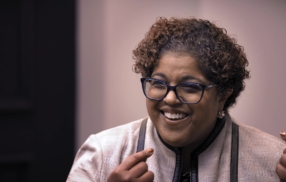
Darden Alumnae Leaders on Leading During Uncertainty
By Dave Hendrick
Times of tumult and uncertainty are challenging for even the most seasoned leaders to navigate, but an ambiguous environment shouldn’t lead to paralysis.
Speaking to the University of Virginia Darden School of Business community at a Women@Darden speaker series event moderated by Darden Professor Vivian Riefberg, Darden alumnae and members of the Darden School Foundation Board of Trustees Martina Hund-Mejean (MBA ’88) and Carolyn Miles (MBA ’88) offered guidance for leading through uncertainty and strategies for sustainable professional growth.
Hund-Mejean, who recently retired as CFO of Mastercard and currently serves as board chair of the Mastercard Impact Fund, recounted her experience joining Lucent just as the telecom bubble began to burst. Starting as treasurer on the same day the board fired its CEO, “uncertainties abounded,” Hund-Mejean said, and she considered returning to her previous company. Instead, she developed a mental framework for assessing the situation and moving forward.
“You have to know what you know and what you don’t know and have to figure out how to be grounded in yourself,” said Hund-Mejean. “Even though problems are mounting, you have to figure out how you stay calm.”
Key priorities in a time of crisis or uncertainty include determining what tasks need to be done in the short term to be able to strategically move forward, forming an effective and trusted team so tasks can be delegated, and accounting for the needs of all stakeholders.
“You need to figure out how to get the 365 degree view fairly fast,” said Hund-Mejean.
Riefberg, who recently taught an MBA course on leading through the uncertainty of the COVID-19 pandemic, stressed the need to be able to “bound the uncertainty” in order to forge a path forward.
Miles, who retired as president and CEO of the humanitarian aid organization Save the Children in 2020, said she had been on the job as COO for less than a year when the Asian Tsunami of 2004 struck, killing 230,000 people and devastating large swaths of multiple countries.
Against the backdrop of unfathomable death and destruction, Miles said she found a way forward by focusing on three things: the welfare of Save the Children employees and volunteers in affected areas; the scope of the damage and impact on children and what they most need; and getting the word out about the crisis in order to raise money to help those in need.
“Leading in a crisis can be a defining moment in your career and is the best way to learn,” said Miles, who was recently named to a senior adviser post at Darden. “Don’t ever run away from crisis.”
Times of crisis are also when you can learn about yourself and the workplace environment. You learn both about EQ, or emotional intelligence, of yourself and the team, but also the DQ, or “decency quotient,” said Hund-Mejean. Crises can help clarify what kind of empathy you have and what kind of culture you have surrounded yourself with.
The COVID-19 crisis tested people and companies in new ways, with barriers between work and home-life dissolved and many companies forced to consider the need to protect the health of their employees in previously unexpected ways. The companies with well-defined senses of EQ and DQ seemed to fare better, Hund-Mejean said.
“This crisis has taught us people have lives outside of work — and those lives outside of work are really important to them,” said Miles. “As leaders, one of the most important things you can do is to talk about these issues.”
The past year showed that there was no such thing as too much communication, especially from a leader, Miles said.
One key topic for leaders to discuss and model for their teams, according to Hund-Mejean: How to message and model the distinctions between work and life, and how to encourage people to not be “24/7 always on.”
Miles and Hund-Mejean said the Darden experience, with the daily drumbeat of simulated “mini-crises” contained in classroom case discussions and organizational behavior classes that put an emphasis on relationship building, were both important building blocks for career success.
Hund-Mejean, Miles and Riefberg are passionate about shaping the future of Darden, and have a keen interest in helping the School become more accessible and equitable. As Darden becomes more representative of how the world works and looks, its capabilities and impact will only grow, they suggested.
Riefberg is co-leading a new Women@Darden initiative, which seeks to make the school the preferred business school for women across the world.
The University of Virginia Darden School of Business prepares responsible global leaders through unparalleled transformational learning experiences. Darden’s graduate degree programs (MBA, MSBA and Ph.D.) and Executive Education & Lifelong Learning programs offered by the Darden School Foundation set the stage for a lifetime of career advancement and impact. Darden’s top-ranked faculty, renowned for teaching excellence, inspires and shapes modern business leadership worldwide through research, thought leadership and business publishing. Darden has Grounds in Charlottesville, Virginia, and the Washington, D.C., area and a global community that includes 18,000 alumni in 90 countries. Darden was established in 1955 at the University of Virginia, a top public university founded by Thomas Jefferson in 1819 in Charlottesville, Virginia.
Press Contact
Molly Mitchell
Senior Associate Director, Editorial and Media Relations
Darden School of Business
University of Virginia
MitchellM@darden.virginia.edu




